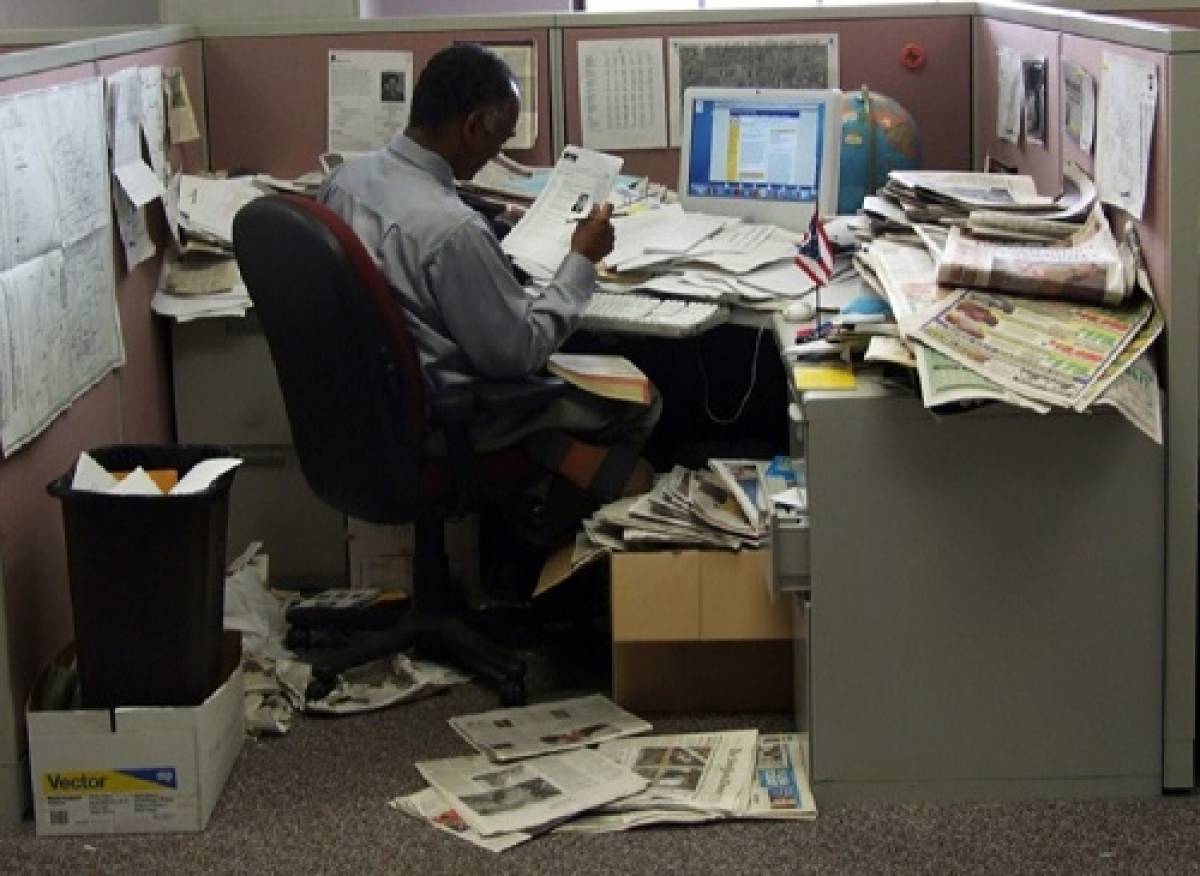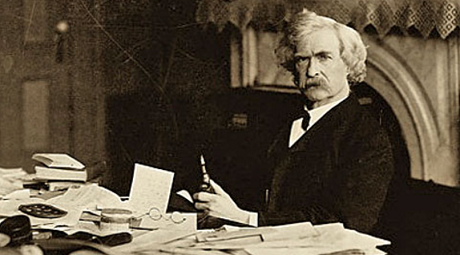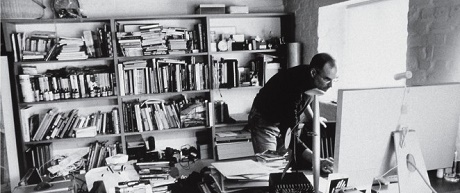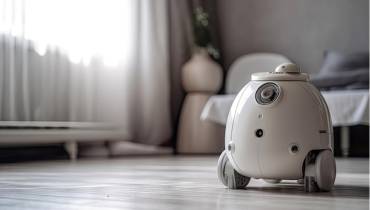A Perfect Mess: Why Disorganized People Are More Creative and Productive

If you are like most people, you probably think those people who are organized are more productive than people who are disorganized. Can’t blame you for thinking that way—that’s how society has led us all to believe. But, an increasing number of experts are now saying that’s not really true.
Apparently, people who are disorganized and messy aren’t necessarily less productive or lazy. They’re just spontaneous, bold and more imaginative. So say Eric Abrahamson and David H. Freedman, authors of “A Perfect Mess: The Hidden Benefits of Disorder.”
Abrahamson and Freedman explain:
"Mess isn't necessarily the absence of order. A messy desk can be a highly effective prioritizing and accessing system. In general, on a messy desk, the more important, urgent work tends to stay close by and near the top of the clutter, while the safely ignorable stuff tends to get buried to the bottom or near the back, which makes perfect sense. The various piles on a messy desk can represent a surprisingly sophisticated informal filing system that offer far more efficiency and flexibility than a filing cabinet could possibly provide."
In other words, a messy desk can boost productivity, depending on the person.

Mark Twain at his desk
Susan Biali, M.D., life coach and author of "Live a Life You Love: 7 Steps to a Healthier, Happier, More Passionate You" agrees. She says that we’re all affected by our surroundings—and some people just work and feel better in a space that isn’t too orderly. For others, though, clutter is very negative. It makes them feel unproductive and their life uncontrolled.
However, if you know where things are, you feel more comfortable that way, and it’s not negatively impacting your ability to work, then "controlled clutter" (as Biali calls it) can actually be more helpful for you.
A study by Kathleen Vohs of the University of Minnesota Carlson School of Management supports Biali’s assertion. According to Vohs’ study, a cluttered environment was found to increase not just efficiency, but also creativity.
In one experiment for the study, Vohs divided 48 study participants into two groups and asked them to come up with new ways to use a ping pong ball. One half of the participants were placed in a messy room and the other half in a tidy room.
Whereas both groups came up with the same number of ideas, a panel of independent judges determined the ideas produced by those in the messy room were far more innovative.
Vohs explained the finding thus:
“Being in a messy room led to something that firms, industries and societies want more of: Creativity. Disorderly environments seem to inspire breaking free of tradition, which can produce fresh insights. Orderly environments, in contrast, encourage convention and playing it safe.”
So, why are we obsessed with being neat and orderly?

Steve Jobs in his home office.
When we are young, we are taught to clean our rooms, and also clean up after ourselves always. “Cleanliness is next to godliness,” we are told. Then we grow up and societal pressure doesn’t relent. We are now told that a cluttered desk is a sign of a cluttered mind. People expect us to maintain order in every sense of the word, and we are made to feel bad about ourselves for being messy.
Not surprisingly, disorganized people are frowned upon in society and labeled lazy or undisciplined. But the neat, orderly world everyone strives for is an illusion. It’s a cheat we use to fool ourselves that life isn’t the random, chaotic mess we secretly know it to be.
Think about it for a moment. In our attempts to establish order, we often create more disorder. When you buy new shoes and new clothes for every possible occasion in the year so that you appear socially appropriate or fashion conscious, your closet inevitably begins to overflow.
When you tidy up your studio or office so that you’re not accused of having an “uncluttered mind,” it soon slides into a mess. You clear out projects, stacks of paper, pens, various tools, and even pull down sticky notes so your workspace is neat and tidy once again, and still – two weeks later – the mess is back.
We’re struggling to keep everything neat and orderly, and we’re failing subtly day-in, day-out. No matter how hard we try to keep our workspace perfectly neat, everything will always fall back into disarray. You see, disorder has nothing to do with your organizing skills; it’s has to do with cosmic laws.
Physicist Adam Frank explains:
“The hard truth is that the universe itself is dead-set against our long-term efforts to bring order to the chaos in our lives. That's because the universe loves chaos.”
That chaos; that disorder; that messiness; that randomness—for physicists, it has a name: Entropy.
Universal laws of entropy ensure disorder is restored
Scientists first discovered the laws of entropy back in the 1800s when they were trying to squeeze as much efficiency as possible in their shiny, new invention—the steam engine. They uncovered a radical, somewhat depressing cosmic principle: The universe always moves from order to disorder, from low entropy to higher entropy. That’s how it’s always been, and how it likely will always be.
So, while you might be able to reduce chaos and maintain a semblance of order in one small space you control like your home, the activities you do to maintain that order create more mess for the rest of the universe. For example, that trash you throw away goes to a landfill and contributes to pollution. See?
Messy, disorganized people might get a bad rap and be labeled lazy, but they are not really lazy. They’ve just seen the light and decided to go with the flow instead of swimming against the current. They would rather spend their limited time in this world doing what they perceive as more meaningful tasks for them, than keep going round in circles on tedious, joyless, recurring activities like tidying up.
Maybe we should follow their lead and say “yes” to the randomness and chaotic nature of the universe, instead of being dictated by neatness or orderliness. Contrary to what conventional wisdom might say, the path toward creative freedom, freedom of the mind is marked by randomness and disorder.
Embrace randomness and disorder
Living a life driven strictly by orderliness will most likely cause you to miss out on simple pleasures of life and the serendipity of unplanned success. However, once you embrace a bit of disorder it can bring tremendous joy and satisfaction in your life because you are now living in harmony with the universe, unshackled.
You might worry that you won’t be productive at work if you are messy and unorganized, but that is not necessarily true. Disorganization is often associated with genius. Many of the world's most creative people from Mark Twain to J.K. Rowling and Albert Einstein achieved greatness in spite of their messiness. We might even argue they achieved greatness because of their messiness.
This is not to say that being organized doesn’t have its merits—it does have merits, but so does being disorganized. A little disorder reminds us that life is not a structured, ordered thing, but something that contains chaos and randomness. That reminder grounds us and spurs our brains into thinking creatively.
So, look within yourself and choose the best environment that works for you, an environment that complements your tendencies. Don’t worry about meeting unrealistic standards of so-called paper-free offices, minimalist workstations, or such organization trends that are all the rage. Some people just work and feel better in a space that isn’t too tidy or orderly.
Live a life you love, not a life you are told to love. People who are true to themselves, who work in environments that suit their personality and work styles are the ones who are more creative, productive and happy.
See Also: 10 Things Highly Authentic Creatives Do Differently
-- A version of this article appeared at Lifehack.org.




















